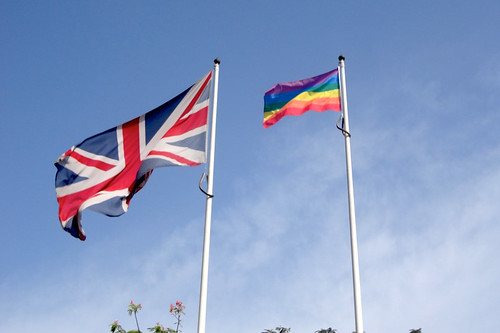19th May 2014 Lima, Peru
A society without homophobia is better for all of us
- By Ben Rawlings, Head of Economic & Sustainable Development at the British Embassy in Lima

This 17 May marked the tenth anniversary of the International Day Against Homophobia and Transphobia. The aim is to draw attention to the violence and discrimination experienced by lesbian, gay, bisexual and transgender people across the world. It is an initiative the UK government supports: human rights are universal and should apply equally to all people, regardless of sexual orientation or gender identity.
A lot has changed in ten years. While a spate of equal marriage laws and repeal of anti-gay legislation have promoted the rights of LGBT people across some areas of the world, in other countries the situation for lesbian, gay, bisexual and transgender people is getting worse. Homosexuality remains illegal in 82 countries, and is punishable by death in seven. We have a long way to go to secure equal rights for LGBT people and, as with all human rights, we must start by looking at what more we should be doing in our own country.
In the UK, I think we have come far: until 2003, it was illegal to “promote” homosexuality in schools, effectively banning discussion of LGBT issues. Just over a decade later we celebrated the first same-sex marriages, and the UK has again been recognised by the International Lesbian and Gay Association as number one in Europe on LGBT equality.
The UK has one of the world’s strongest legislative frameworks to prevent and tackle discrimination, including on the grounds of sexual orientation. In 2011 the first cross Government action plan on LGBT equality outlined an ambitious range of actions to promote LGBT equality, including requiring police forces to collect data on hate crimes against LGBT people and an online reporting tool. The same year, the world’s first transgender equality action plan set out specific actions to address the challenges that transgender people face in their daily lives.
But promoting and safeguarding LGBT rights – and all human rights – isn’t just about legislation. It is about supporting human rights defenders, changing attitudes and challenging harmful social conventions, and promoting a more supportive and safer environment so that everyone can live their lives without having to pretend to be someone or something they are not. That is why the UK government is working to understand what works in preventing and tackling homophobic bullying in schools, to take action to prevent the harm caused. An initiative to tackle homophobia and transphobia in sport is backed by more than 40 National Governing Bodies, including all professional football clubs. This included the London Olympics and Paralympics Organising Committee, ensuring that everyone who came to London to watch or participate in the Games knew we welcomed all athletes, whatever their sexual orientation or gender identity.
In 2004, the year of the first International Day Against Homophobia and Transphobia, same-sex civil unions were introduced in the UK to give gay and lesbian couples the right to formalise their relationship, not only gaining important rights but also allowing them to make a public statement of their love for one another. As British Prime Minister David Cameron said recently; “when people’s love is divided by law, it is the law that needs to change”. I know from personal experience how important it can be to LGBT people to be able to show publicly their love and commitment, in the same way that a heterosexual couple can. Just this week we were able to help one couple do just that, conducting a civil union here in the Embassy.
But it is more than that: by recognising the basic right of two people to enter into a stable, loving partnership, regardless of their sexual orientation or gender identity, we send a powerful message about equality. A message that eventually will help create a society in which LGBT people feel able to be themselves without fear of persecution or judgement. Where they can study and work without fear of dismissal, bullying or discrimination. Where they can go to shops and bars and restaurants and theatres without fear of attack or intimidation. Where they can engage with state and society – reporting crime, volunteering – without fear of prejudice. That is a society that is better for everyone.